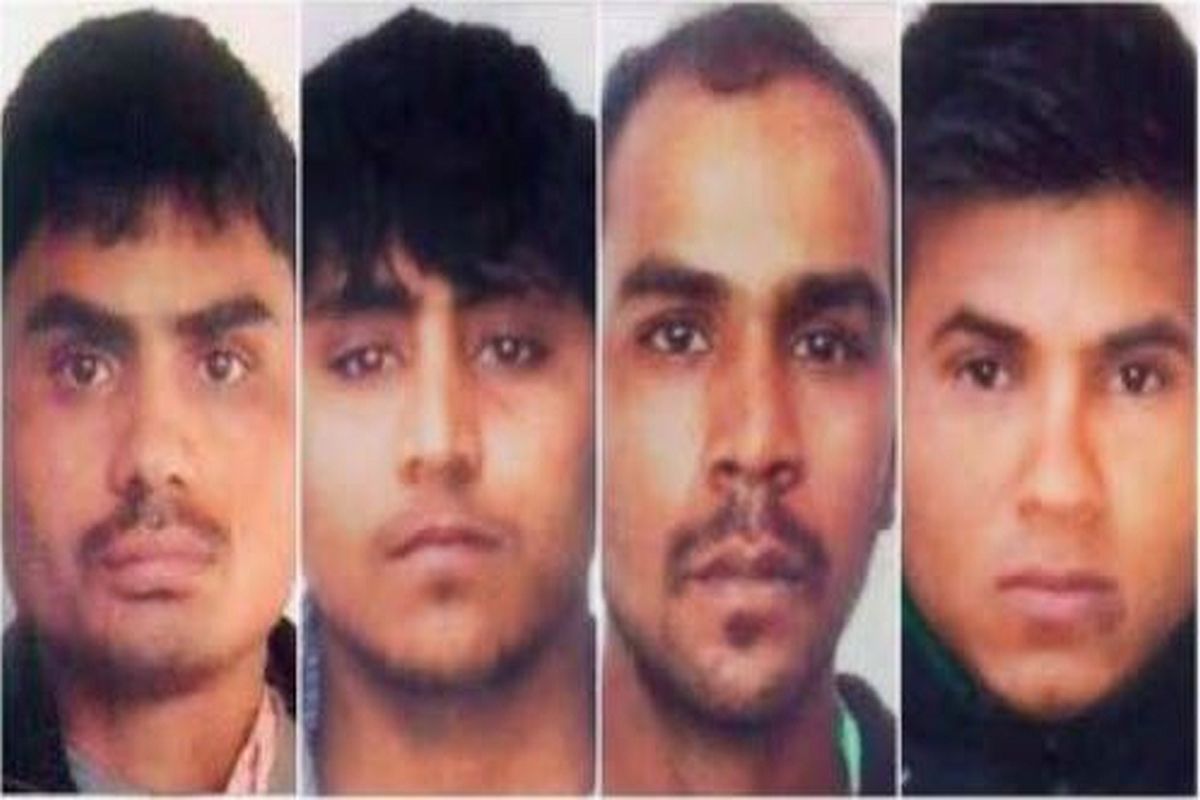EC defends integrity of EVMs in SC, asserts it can’t be manipulated
The Election Commission of India (ECI) defended the integrity of the electronic voting system, asserting that it was not prone to any external interference or manipulations.
Mukesh Singh, one of the death-row convicts in the Nirbhaya gangrape and murder case, had on Monday moved the top court seeking urgent hearing on his plea against the dismissal of his mercy petition by President

Nirbhaya convicts Akshay Thakur Singh, Pawan Gupta, Mukesh Singh and Vinay Sharma. (Photo: Twitter | @7ru7h_1)
With three days remaining for the execution of Nirbhaya convicts, the Supreme Court on Wednesday dismissed convict Mukesh Singh’s plea seeking judicial review of the rejection of his mercy petition by President Ram Nath Kovind.
Dismissing the plea, the top court said that there is no merit in the contention and added that alleged torture claims cannot be a ground for mercy.
The court maintained that all documents were placed before the President and he had taken them into consideration.
Advertisement
The counsel for Nirbhaya convict Mukesh Singh had on Tuesday had told the Supreme Court that he was “beaten and sexually assaulted” in Tihar jail.
Senior advocate Anjana Prakash said this to the Supreme Court during the hearing of Singh’s plea challenging the rejection of his mercy request by President Ram Nath Kovind.
Singh’s lawyer argued before the Supreme Court that all records were not sent to the President and therefore his decision to reject mercy was “arbitrary and malafide”.
“I was sexually abused in Tihar jail. I was forced to have sexual intercourse with co-accused 31-year-old Akshay. I was also severely beaten up many times.
“All these statements were given by me but these were not placed before the President,” Prakash claimed in her submission before the court.
Levelling serious accusations against the Tihar Jail authorities, Mukesh’s lawyer added that her 32-year-old client was forced to have sex in front of other prisoners.
Contending that her client has been sentenced to death, Anjana Prakash asked: “Courts only sentenced me to death..was I sentenced to be sexually abused?”
She also contended before the court that several supervening circumstances, which included his illegal solitary confinement, were ignored when the mercy petition was rejected by the President.
Solicitor General Tushar Mehta, appearing for the Centre, countered Mukesh Singh’s arguments, arguing that it was strange that questions about the sanctity of life are being raised by the convict.
The mercy plea was, once filed by Mukesh Singh, processed quickly and sent with the recommendations in line with the rules. The President was not sitting in appeal over the judicial decision of courts, Mehta said.
Mukesh Singh, one of the death-row convicts in the Nirbhaya gangrape and murder case, had on Monday moved the court seeking urgent hearing on his plea against the dismissal of his mercy petition by President Ram Nath Kovind.
Mukesh Singh, 32, submitted the plea last week. His mercy plea was dismissed by the President on January 17.
On this, a bench headed by Chief Justice SA Bobde and comprising Justices BR Gavai and Surya Kant had observed that the petition of the death-row convicts should be listed on “top priority”.
Delhi’s Patiala House Court on January 17 issued a fresh death warrant against the four convicts in the 2012 Nirbhaya rape and murder case, who will now be executed at 6 am on February 1.
According to a January 7 order, the convicts — Vinay Sharma (26), Mukesh Kumar (32), Akshay Thakur Singh (31) and Pawan Gupta (25) — who were found guilty in the rape and murder of a Delhi medical student, were to be hanged at 7 am on January 22.
The 23-year-old victim, who came to be known as Nirbhaya, was brutally gangraped and tortured on December 16, 2012, inside a running bus in south Delhi by six persons, which later led to her death. All the six accused were arrested and charged with sexual assault and murder.
Four of the convicts were sentenced to death by a trial court in September 2013, and the verdict was confirmed by the Delhi High Court in March 2014 and upheld by the Supreme Court in May 2017, which also dismissed their review petitions.
The fifth accused was a minor and appeared before a juvenile justice court, while a sixth accused committed suicide in Tihar Jail.
Advertisement